
Cinta Pertama is a 1973 Indonesian romance film directed by Teguh Karya. Starring Christine Hakim, Slamet Rahardjo, and N. Riantiarno, it tells the story of Ade, a young woman who falls in love with Bastian, an ex-convict, yet is engaged to Johny, who raped Bastian's wife and caused her to be killed in the resulting fight. It was well-received both critically and commercially, garnering five Citra Awards and launching Christine Hakim's career. Tabloid Bintang has listed it as the 19th best Indonesian film of all time.
Si Pitoeng is a film from the Dutch East Indies that was released in 1931. Directed by the Wong brothers and starring Herman Shim and Ining Resmini, it was the first film based on the life of Si Pitung, a bandit from Batavia.

Eulis Atjih is a 1927 film from the Dutch East Indies ; it was the second feature film produced in the country, after Loetoeng Kasaroeng in 1926. The silent film follows the lives of a native Indonesian family sent into poverty by the husband's splurging. Eulis Atjih was a commercial success in the Indies, but failed in international markets.

Tan's Film was a film production house in the Dutch East Indies. Established by the brothers Tan Khoen Yauw and Tan Khoen Hian on September 1, 1929, its films were mostly targeted at native ethnic groups. Starting with Njai Dasima in 1929, the company released fifteen movies before ultimately being dissolved after the Japanese occupation. The Tans and the Wong brothers established Tan & Wong Bros in 1948 to continue this work.

Pareh, released internationally as Pareh, Song of the Rice, is a 1936 film from the Dutch East Indies. Directed by the Dutchmen Albert Balink and Mannus Franken, it featured an amateur native cast and starred Raden Mochtar and Soekarsih. The story follows the forbidden love between a fisherman and a farmer's daughter.
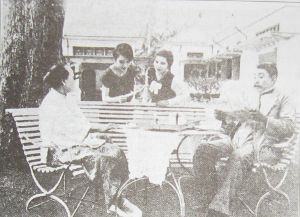
Lilly van Java, also known as Melatie van Java, is a 1928 film from the Dutch East Indies directed by Nelson Wong. Initially meant to be produced by South Sea Film and shot by an American director, the film – which follows a woman told to marry a man she does not love – was ultimately completed by Wong's Halimoen Film. Details on its cast and performance are contradictory, although the film is recognised as the first of a long series of ethnic Chinese-produced films in the country. It is likely a lost film.
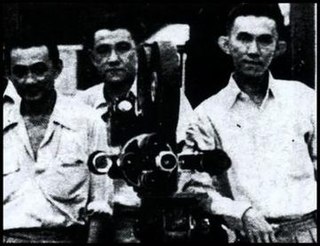
The Wong brothers were three ethnic Chinese film directors and cameramen active in the cinema of the Dutch East Indies. The sons of an Adventist preacher, the brothers – Nelson (1895–1945), Joshua (1906–1981), and Othniel (1908–1986) – received much of their education in the United States before going to Shanghai and establishing The Great Wall Productions.
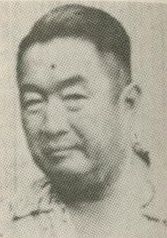
Fred Young was an ethnic Chinese film director and producer active in the Dutch East Indies and its successor state, Indonesia. He reportedly studied film in Hollywood as a youth, but only entered the nation's film industry in 1940. After he made his debut as a writer with Sorga Palsoe, he was involved in some 36 productions, 23 as director.
Tan Tjoei Hock was an Indonesian journalist and filmmaker. Born in Batavia, he was discovered by The Teng Chun in the late 1930s. Tan became one of the most productive film directors of the Dutch East Indies between 1940 and 1941, directing nine films – primarily action.
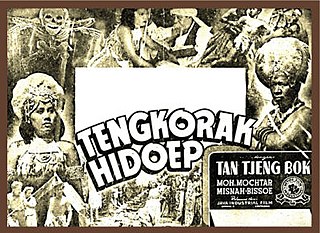
Tengkorak Hidoep is a 1941 film from the Dutch East Indies directed by Tan Tjoei Hock. It has been called Indonesia's first domestic horror film.

Indonesia Malaise is a 1931 film directed by the Wong brothers. It was the brothers' first sound film and one of the first such films in the Dutch East Indies. Billed as a comedy, the story follows a woman who is overcome by tragedy in her personal life. A commercial failure, it may be lost.
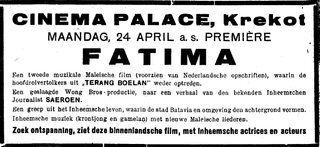
Fatima is a 1938 film from the Dutch East Indies directed by Othniel and Joshua Wong. Written by Saeroen, it starred Roekiah, Rd Mochtar, and ET Effendi and followed two lovers who are disturbed by a rich youth. The film followed the same formula as the earlier hit Terang Boelan, and saw commercial success domestically. It is one of three films which Misbach Yusa Biran credits with reviving the domestic film industry, which had been faltering.

Sejarah Film 1900–1950: Bikin Film di Jawa is a 2009 history of the cinema of the Dutch East Indies written by Misbach Yusa Biran. It was published by Komunitas Bambu in collaboration with the Jakarta Arts Council and well received. The book was written by Biran before his death, three years later.

Gagak Item is a 1939 bandit film from the Dutch East Indies directed by Joshua and Othniel Wong for Tan's Film. Starring Rd Mochtar, Roekiah, and Eddy T. Effendi, it follows a masked man known only as "Gagak Item". The black-and-white film, which featured the cast and crew from the 1937 hit Terang Boelan, was a commercial success and received positive reviews upon release. It is likely lost.

Bajar dengan Djiwa is a believed lost 1941 film from the Dutch East Indies. Directed by R Hu and produced by Ang Hock Liem, it starred A Bakar, Djoewariah, O Parma, Oedjang, RS Fatimah, Soelastri, and Zonder. The story centers on two families torn apart by finances and clashes of personality.

Mas Sardi was an Indonesian composer and musician notable for being the country's first professional music supervisor. He and his wife Hadidjah were the parents of Citra Award-winning musician Idris Sardi.

Ng. Ratu Djoewariah was an Indonesian actress active in the 1940s and 1950s.

Air Mata Mengalir di Tjitarum is a 1948 film from what is now Indonesia, written and directed by Roestam Sutan Palindih for the Tan & Wong Bros Film Company.
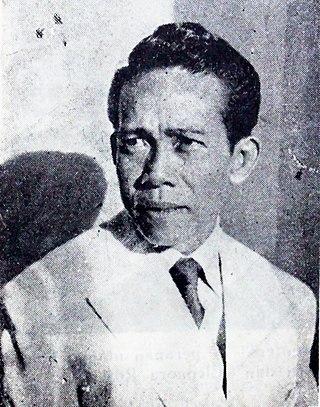
Rempo Urip was an Indonesian film director. He began his career in the theatre, serving as an extra and footballer for the Dardanella theatre company beginning in 1934. After six years and three troupes, Urip entered the film industry, working as a distributor for Oriental Film and assistant director for Java Industrial Film. He returned to the theatre during the Japanese occupation (1942–1945) and national revolution (1945–1949). In 1951 he joined Djamaluddin Malik's Persari as a director, completing thirteen films for the company before it closed in 1958. He continued as a freelance director until 1977.

Saputangan is a 1949 romance film from what is now Indonesia. Directed by Fred Young and starring Chatir Harro, Noorsini, and Astaman, it follows a young doctor who, after his fiancée is blinded in an automobile accident, becomes an optometrist and restores her sight.


















